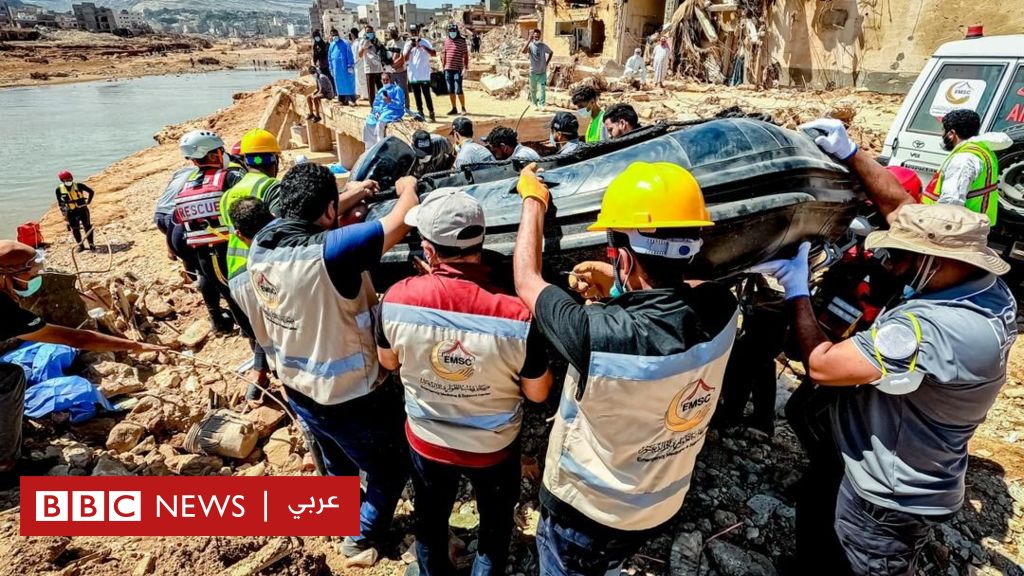Image source: Emergency Medicine and Support Centre
Comment on the photo,
Rescue teams face obstacles due to the rugged geographical nature of the mountains and valleys in the city of Derna.
Article informationAuthor, Zainab Dabaa Role, BBC News
5 hours ago
Dr. Ahmed Zouiten, representative of the World Health Organization in Libya, said that the organization has no evidence that the bodies of those killed by Hurricane Daniel carry any serious infectious diseases, even if they are decomposed.
Zouiten added, in an interview with the BBC, by saying that “this could be the case if the death was linked to an infectious disease such as cholera or Ebola.”
These statements come in the wake of fears that have begun to spread on the horizon that the accumulated bodies may cause the spread of epidemics in Derna, one of the Libyan cities most affected by the hurricane.
In this regard, Zuiten said that any diseases or infections can only be transmitted through polluted water, adding that “there is an urgent need to provide the population with safe drinking water as well as sanitation to avoid transmitting any diseases through water or food.”
Zouiten pointed out that one of the World Health Organization’s priorities now is to provide vaccinations to pregnant women and children.
He added: “We have seen in different settings that when vaccination programs are disrupted, we may expect the re-emergence of some diseases such as measles, and there are some examples in which we have seen cases of polio.”
Zouiten also said that he will go on Tuesday, accompanied by a team from the organization, to the city of Derna, where some hospitals are no longer in service due to a lack of medicines and medical equipment.
He added, “Therefore, we will bring with us more of this medicine to distribute it to a number of centers there now and in other areas,” noting that there will be some mobile clinics to reach those areas.
Mixing of drinking water with wastewater
Image source: Dr. Al-Zarrouk Al-Zaidi
Comment on the photo,
Nearly a week later, many bodies are still in a state of great decay.
In addition to the lack of medical care, residents of Derna suffer from a lack of clean water.
In this regard, Malek Morsi, the official spokesman for the Emergency and Support Center in the Libyan Ministry of Health, told the BBC that “sewage water mixed with groundwater wells” in the city of Derna, which “depends on groundwater wells as a source of water.”
Al-Zarrouk Al-Zaidi, a member of the Supreme Committee for Crisis Management, said from inside the city of Derna to the BBC: “We have actually begun taking samples of the wells to ensure the safety of the water…… This issue is one of the priorities. The alternative sources are to bring water purification units and provide a source of water.” outside tuber.”
Civil society organizations have begun providing clean drinking water to those affected by the hurricane. Omar Al-Tabbal, leader of the Relief and Humanitarian Work Team at the Libyan Youth Hostels Association, told the BBC: “During the first hours of our entry into Derna, we found a major shortage in terms of the availability of drinking water. Accordingly, we worked to provide that water. Up to this point, we have distributed more than twenty One thousand boxes of water” through the association’s relief support team.
Nearly a week after the storm, the challenges facing rescuers are increasing. Malek Morsi, the official spokesman for the Emergency and Support Center in the Libyan Ministry of Health, says that there are obstacles hindering the work of rescue teams, such as logistical support and opening corridors for rescue teams to enter amid the spread of bodies, in addition to the rugged geographical nature of the mountains and valleys in the city of Derna.
‘We are now using two masks instead of one mask’
Image source: Emergency Medicine and Support Centre
Comment on the photo,
Major Fathi Mugheib Al-Karimi, head of the National Safety Authority department in the city of Derna, says that the sea is still throwing up bodies.
Major Fathi Mugheib Al-Karimi, head of the National Safety Authority department in Derna, says: “We exhumed bodies, and because the bodies were a week old, they are in a state of great decay.” But the largest percentage of bodies are inside the sea, where the majority of the population tried to escape from the floods to the sea, which is not possible. He is still vomiting corpses, according to Al-Karimi.
Al-Kuraimi added to the BBC: “We received a lot of aid from countries, but the crisis is great and there is almost a city under the sea.”
As for the procedures for sterilizing corpses, the head of the National Safety Authority department in Derna says, “When we find a corpse under the rubble, we clean it well and put it in bags, and of course we have gloves and sterilizers, but the smell of corpses has become stronger… and thus we have started using two masks instead of one mask.” “.
Dr. Al-Zarrouk Al-Zaidi, a member of the Supreme Committee for Crisis Management from inside Derna, denies what has been circulated on social media about the spread of epidemics in the city of Derna, saying: “So far there are no epidemics and no indications of the emergence of any epidemic,” adding that there is a campaign to vaccinate citizens and medical staff. And people who deal directly with dead bodies.
Al-Zaidi adds: “From the first hours of the disaster, we formed an emergency committee headed by Dr. Adnan Abdel Jalil, Minister of Health in the Libyan government, and we took into consideration all possibilities and all scenarios, including the spread of epidemics and plans to evacuate citizens in the event of an epidemic.”
Image source: Dr. Al-Zarrouk Al-Zaidi
Comment on the photo,
Dr. Al-Zarrouk Al-Zaidi, a member of the Supreme Committee for Crisis Management in the city of Derna, denied the spread of epidemics in the city due to the accumulation of corpses.
‘We do not expect that there is an epidemic in the city of Derna’
Following fears of the spread of epidemics within the city of Derna, on Tuesday, a team of consultants from the College of Public Health in Benazi arrived in the city, to begin conducting a complete study to research and evaluate natural disasters and evaluate the quality of drinking water, food safety, and nutrition.
Dr. Randa Al-Amrouni, Dean of the Faculty of Public Health at the University of Benghazi, who heads the team, says: “We have experts in infection and reducing its spread, and the situation will be evaluated and direct solutions will be developed in the same plan, as well as instructions will be set, including complete sterilization.”
Al-Amrouni added to the BBC: “As public health experts, we do not expect that there is an epidemic in the city of Derna. Some rescue teams provided us with some information that does not suggest or give results of the spread of any epidemic, because the condition of the bodies is healthy and they are not exposed to any injuries.”
Hurricane Daniel caused catastrophic losses in eastern Libya. The hurricane swept away entire residential neighborhoods in the city of Derna, and the number of deaths as a result of the floods was horrific and estimated in the thousands.
2023-09-19 23:28:09
#Hurricane #Daniel #evidence #epidemic #spreading #Derna #due #accumulated #bodies #World #Health


